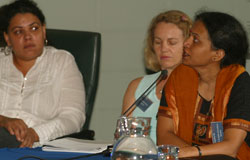
(l-r) Ms Jean Fenton, Dr Natasha Stacey, Dr Leena Srivastava
“Tense, confronting and honest” is how the Chair of the Symposium, Justin Murphy, described day one of the forum.
“The Symposium was intended to be confronting, and the convenors weren’t disappointed, with people rising to the challenge,” Mr Murphy said.
Mr Murphy set the tone for the first day’s discussions, urging those in research fields to use the media to initiate change.
He told an audience of around 150 people about the time when as a CSIRO employee in Perth, he sparked national interest and subsequently awareness of responsible water use by speaking on an ABC Radio gardening program.
“For organisations like CDU who have the vision and desire to reach out to the community to find out the attitudes and foster understanding – mass media has to be there in partnership,” Mr Murphy said.
The Symposium immediately launched a challenging debate about the NT Government’s approach to economic and social policy, with an impassioned presentation by Dr Rolf Gerritsen, CDU Professional Fellow for Tropical Savannas, and former Director of Social and Economic policy in the Chief Minister’s Office.
“The problem with itinerants is not the Aboriginal people in Smith Street Mall but the rest of us who come for a couple of years and leave,” he said.
Dr Gerritsen said the NT Government was allocating resources on a “build it and they will come” basis, when they should be investing in industries that develop the existing social capital of the Territory, in particular Indigenous people.
Other speakers included Australian National University’s Professor Will Steffen who spoke about the impact melting ice shelfs and rising sea levels would have on potential future storm surges.
After lunch, the Symposium took on an Indigenous flavour, with discussion on developing a culture-based economy for Northern Australia.
Joe Morrison and Jean Fenton from the North Australian Indigenous Land and Sea Management Alliance spoke about the need to counteract social dysfunction by fostering traditional and non-traditional Indigenous business opportunities.
Mr Morrison said while many industries including pearling, fishing and mining had been built on the backbone of Indigenous people, there was little coming back to these communities by way of employment and business opportunities.
Ms Fenton analysed the impact of the Federal Government’s decision to veto the commercial use of wildlife in Indigenous communities.
She said the decision not to allow Indigenous communities to run a regulated business of crocodile hunting safaris, based on a powerful animal rights lobby, was perpetuating the cycle of poverty.
“At present, about 600 crocodiles are culled each year. Senator Ian Campbell cited the fact that crocodiles are an ‘iconic species’. So Aboriginal people think: Are we valued less than an iconic species?” Ms Fenten said.
Co-convenor of the Symposium, Professor Bruce Campbell, from CDU’s School of Environmental Research, challenged the notions that population growth necessitates environmental damage and that Indigenous peoples exploit the natural environment.
Professor Campbell used the example of cycad harvesting to illustrate that over-regulation was counter-productive, and that while local people and the environment sometimes collide, environmental projects could be used to create social capital.
CDU Professor of Tropical Knowledge, Steven Garnett, suggested policy changes are needed to create profitable livelihoods for Indigenous people. He used the example of bush foods, and said there was currently no protection for Indigenous people in industries derived from wild harvest products on their Country.
The focus of discussions intensified during the afternoon panel discussion.
Audio and visual presentations from the Symposium on Day one are available to download from the presentation page on the Symposium website.